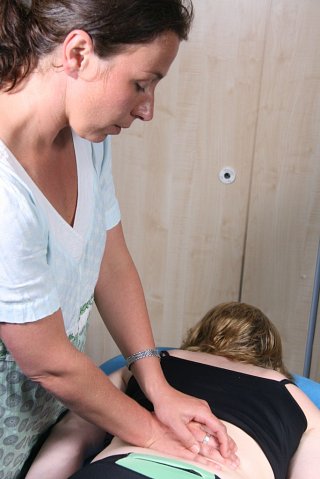Herniated Disc Treatment
We have looked at the causes of a Herniated Disc, along with the symptoms of a Herniated disc. Now let us look at what is the best approach for a herniated disc treatment?
Ways to Treat a Herniated Disc

A quick summary of the main ways to treat a herniated disc are as follows:
- The majority of disc herniations will resolve following rest AND good postural positioning - especially if you take this approach at the early stages.
- Mobilisation through manual therapy is important to help ease your disc back into its correct position. Exercises are also important to help strengthen the muscles around the disc, so they can support and take some of the pressure of it.
- Medication may sometimes be necessary for pain reduction associated with mobility.
- In some situations, surgery may be the only option.
Choosing the correct treatment option will depend on a number of aspects of your condition. I will go through each in turn and describe how I would approach treatment if you were a client in my own clinic (following very careful diagnosis of course - please remember that herniated discs are delicate conditions that require careful handling and individual conditions can vary a lot):
Sponsored links
-
The signs and symptoms present: Your herniated disc symptoms will dictate the treatment required for your disc herniation. As a physiotherapist working daily with herniated disc clients, I can tell you that there are many conservative treatment options for your herniated disc. I commonly use mobilisation techniques in a directional manner.
That means easing your disc back into place using specific techniques in the direction in which it needs to go. Once we have your disc back in its correct position, I then teach you specific exercises to strengthen the muscles around the weakened area of your spine, to help protect your disc from tearing again in the future. If your posture is poor and was an underlying cause of your disc herniation, then we would look to correct and improve your posture as well. -
Duration of your symptoms and the affect your symptoms are having on your daily life: If your herniated disc symptoms have been with you for days, I will attempt mobilisation therapy to correct your disc alignment.
If, however, your symptoms are very severe and you cannot tolerate treatment or mobility due to pain, I will ask your doctor to prescribe medication to reduce your pain so that I continue to work on addressing the cause of your symptoms. In more severe cases, where even medication is not helping, or if the patient displays neurological signs such as numbness or lack of bladder control, then immediate referral for a surgical option and possible surgical intervention is needed, as the risks of manual treatment are too great. I will typically see the patient again following surgery as part of a recovery program.
-
Response to initial treatments: Rest and avoidance of aggravating movements is the initial treatment of choice in disc herniations. Most disc herniations, if addressed at the early stages, will resolve with rest and good positioning. However, if your disc pain is worsening with rest, or if you develop severe signs such as problems with your waterworks or numbness in your saddle area, you should seek immediate medical attention from your doctor or physiotherapist, who will refer you onto a surgeon, as surgery may be required.
- The size and direction of your disc herniation: If you have a typically common posterior or posteriolateral disc herniation of moderate size, then my manual treatment usually resolves you of your pain and disc herniation. However, if you have a large protrusion causing neurological signs, or you have an anterior herniation, you may be referred on for surgical review as this type of disc herniation generally responds poorly to physical therapy management in my experience.
So you see there are a number of aspects to consider when treating a herniated disc. What I have tried to demonstrate in this article is that if you have herniated disc symptoms, you should not ignore them. It is essential that you seek medical advice and get a correct diagnosis as to what disc has herniated and what the nature of the herniation is. Following that, an appropriate treatment program will be developed for your condition - not only to alleviate the symptoms, but to prevent it from happening again.
DISCLAIMER
While the content and materials contained in the articles on this website have been written & researched by Sally Ann Quirke, a professional, practising & fully qualified Chartered Physiotherapist (Physical Therapist) based in Ireland, they are provided for general information and educational purposes only. They do not constitute medical advice on any particular individual situation. Please see your Chartered Physiotherapist or other medical practitioner for full and individual consultation.
Please read the full disclaimer here.
Cookies and Privacy
By using this website, you consent to the use of cookies in accordance with our cookie policy. For more information on how we use cookies, please read our cookie policy here.
